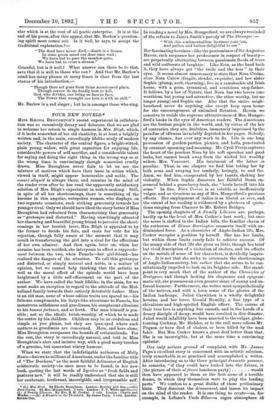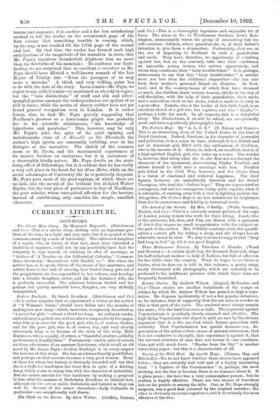FOUR NEW NOVELS.*
Miss RHODA BROUGHTON'S recent experiment in collabora- tion was so excessively dreary and dolorous, that we are glad to welcome her return to single harness in Mrs. Bligh, which, if it lacks somewhat of her old elasticity, is at least a brightly written and, in the main, exceedingly lifelike study of modern society. The character of the central figure, a bright-witted, plain young widow, with great capacities for enjoying life, considerable powers of self-sacrifice, and a considerable talent for saying and doing the right thing in the wrong way or at the wrong time, is convincingly though somewhat cruelly drawn. Miss Broughton never fails to let us see the mixture of motives which have their issue in action which, viewed in itself, might appear honourable and noble. The amori aliquid is always there, and remains in the mind of the reader even after he has read the apparently satisfactory solution of Mrs. Bligh's experiment in match-making. Still, in spite of all her shortcomings, there is something of the heroine in this angular, outspoken woman, who displays, on two separate occasions, such striking generosity towards her younger rival. Only we should have liked the story better if Miss Broughton had refrained from characterising that generosity as "grotesque and distorted." Having unwittingly educated her charming and beautiful young friend to perceive the short- comings in her boorish lover, Mrs. Bligh is appealed to by the former to decide his fate, and casts her vote for his rejection, though fully aware at the moment that it may result in transforming the girl into a rival for the affections of her own admirer. And then again, later on, when her surmise has been verified, she interposes to effect a rapproche- ment between the two, when Pamela—her girl-friend—has realised the dangers of the situation. To call this grotesque and distorted, or simply natural and noble, is a matter of opinion, but we cannot help thinking that the artistic as well as the moral effect of the episode would have been heightened by a little self-effacement on the part of the author. We have called the book lifelike, in the main, for we must make an exception in regard to the attitude of the Mul- holland family towards their entirely detestable father. Here is an old man, none of whose odious traits are spared us,—his fulsome compliments, his Satyr-like attentions to Pamela, his monstrous selfishness and greediness, his complacent allusions to his bonnes fortunes, and so forth. The man himself is pos- sible; not so the idiotic fetish-worship of which he is made the centre by his children. Children may be as credulous and simple as you please, but they are lynx-eyed where such matters as greediness are concerned. Here, and here alone, Miss Broughton overpasses the bounds of verisimilitude. For the rest, the story is exceedingly natural, and told in Miss Broughton's alert and incisive way, with a good many touches of a genuine, but somewhat wintry humour.
When we state that the indefatigable authoress of Molly Baton—known to millions of Americans, under the familiar title of "The Duchess," as the most faithful delineator of English aristocratic society—is once more to be found, in her new book, quoting the last words of Lycidas as " fresh fields and pastures new," it will be readily understood that she is still her exuberant, irrelevant, incorrigible, and irrepressible self.
• (1.) Mrs. Bills. By Rhoda Broughton. London: Bentley and Son..----(2.) Nom (!rains. By Mrs. Hnugerford. 3 vole. London: F. V. White and CO.— (3.1 A Family Likeness. By Mrs. B. M. Croker. 3 vols. London : Chatto and Wind= —(4.) A Stumble on the Threshold, By Tames Payn. 2 vols. London: Horace Cox.
In reading a novel by Mrs. Hungerford, we are always reminded of the refrain to James Smith's parody of The Stranger :—
" With this sentimentalibus lacrimae roar 'em,
And pathos and bathos delightful to see "
Her fascinating heroines—like the pantomimes of Sir Augustus Harris, each surpasses her predecessor in respect of beauty— are perpetually alternating between passionate floods of tears. and wild outbursts of laughter. Like Erin, as the bard bath• it, they have always got "the smile and the tear" in their eyes. It seems almost unnecessary to state that Nora Creina, alias Nora Carew (fragile, slender, exquisite), and her sister Sophie (plump, arch, charming), live in a ramshackle old Irish- house, with a grim, tyrannical, and avaricious step-father.. It follows, by a law of Nature, that Nora has two lovers (one worthless, but young and attractive ; the other worthy, but no longer young) and Sophie one. Also that the entire neigh- bourhood never do anything else except keep open house for the encouragement of unlimited flirtation. Herein we conceive to reside the supreme attractiveness of Mrs. Hunger- ford's books in the eyes of American readers. The Americans are the busiest people in the world, and, by virtue of the law of contraries, they are, doubtless, immensely impressed by the- paradise of idleness invariably depicted in her pages. Nobody, by any chance, has ever any work to do. Life is one long procession of garden-parties, picnics, and balls, punctuated by constant spooning and mooning. Mr. Cyril Ferris captures the heart of the peerless Nora by his soft speeches and good looks, but cannot break away from the wicked but wealthy widow, Mrs. Vancourt. His treatment of the latter is peculiar. Thus, in one chapter we find him taking her by both arms and swaying her tenderly, lovingly, to and fro. Anon, we find him, exasperated by her taunts, shaking her• violently. When Sophie discovers her faithful Denis en- sconced behind a gooseberry-bush, she " hurls herself into his arms." In fine, Nora Creina is as voluble, as inoffensively vulgar, and as vivacious as any of Mrs. Hungerford's previous. efforts. Her employment of italics is as liberal as ever, and the extent of her reading is evidenced by a plethora of quota- tions ranging from Chaucer to Mr. Robert Bridges.
The opening chapters of A Family Likeness are, perhaps, hardly up to the level of Mrs. Croker's best work ; but once- the scene is shifted to the Indian hills, the familiar charm of the authoress of Diana Barrington reasserts itself with un- diminished force. As a chronicler of Anglo-Indian life, Mrs. Croker occupies a position by herself. She has her limits,. but within those limits rarely fails to achieve success. or the seamy side of that life she gives us little, though her brief but vivid description of a visitation of cholera, and its effects on the morale of some of her characters, is decidedly impres- sive. It is not that she seeks to extenuate the shortcomings of Anglo-Indian society, but rather that she seems to be con- stitutionally impelled to look on its brighter side. Her stand- point is very much that of the author of the Chronicles of Dustypore, and though lacking his eloquence and epigram- matic wit, she possesses an even greater share of sunny and un- forced humour. Furthermore, she writes most sympathetically of the natives, and with a keen sense of the glories of the- Indian landscape. Juliet Carwithen is a wholly delightful/ heroine, and her lover, Gerald Romilly, a fine type of a chivalrous and high-spirited English officer. The course of their true love is anything but smooth, and in the hands of a dreary disciple of decay, would have resulted in dire disaster. Juliet would infallibly have been married to the vulgar, globe- trotting Cockney, Mr. Hodder, or to the still more odious Mr. Pogson, or have died of cholera, or been killed by the mad fakir. But Mrs. Croker knows a great deal better than that. She is an incorrigible, but at the same time a convincing, optimist.
Our only serious ground of complaint with Mr. James Payn's excellent story is concerned with an artistic solecism, truly remarkable in so practised and accomplished a writer.. After introducing us to the three principal dramatis persona. he remarks, "if they could have looked into the future, it [the picture of their alfresco luncheon party] would then have appeared to them as the first scene of a terrible drama, in which they themselves were to play the leading
parts." We confess to a great dislike of these preliminary hints. They discount the denouement, and lessen its impact on the mind of the reader. It is one thing to create—as, for example, in Lefann's Uncle Silas—a vague atmosphere of horror and suspense; it is another and a far less satisfactory method to tell the reader on the seventeenth page of the first volume that something terrible is coming, which, by-the-way, is not reached till the 197th page of the second and last. By that time the reader has formed such high anticipations of the magnitude of the sensation in store, that Mr. Payn's ingenious thunderbolt frightens him no more than the fireworks of his namesake. To continue our fault- finding, we are surprised that so excellent a raconteur as Mr. Payn should have diluted a well-known remark of the late Master of Trinity, into " Even the youngest of us may make a mistake." A third, and very trifling, point has to do with the date of the story. Lawn-tennis—Mr. Payn, we regret to say, calls it tennis—is mentioned as already in vogue; but the " vain distinctions " of stuff and silk and silver- spangled gowns amongst the undergraduates are spoken of as still in force; while the merits of sherry cobbler have not yet found general recognition even in London. It is rather funny, also, to find Mr. Payn gravely suggesting that Needham's prowess as a lawn-tennis player was probably due to his scientific attainments, " his knowledge of hyperboles and parabolas." This, however, may be only Mr. Payn's joke, for, spite of the quiet opening and melodramatic close of A Stumble on the Threshold, the author's high spirits are constantly bubbling over in the dialogue or the narrative. The sketch of the common room at St. Neots, and the matrimonial experiences of its master, borders on caricature, but it is caricature of a thoroughly kindly nature. Mr. Payn dwells on the steri- lising effect of fellowships, but it is evident that he has really a very soft place in his heart for his Alma Mater, while on the social advantages of University life he is positively eloquent. Mr. Payn puts most of his good sayings, of which there are no lack, into the month of the brilliant but ill-fated Walter Blythe, but the best piece of portraiture is that of Needham, the poor scholar, whose unrequited affection for the heroine, instead of embittering, only ennobles his simple, unselfish character.







































 Previous page
Previous page